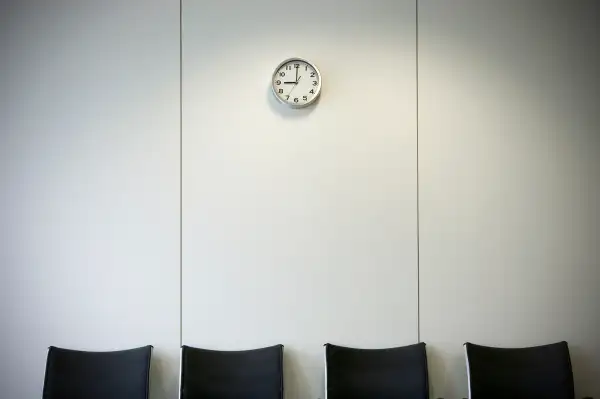Best Times to Ask for a Raise, Eat Lunch, or Even Binge-Watch

We all have an internal clock that ticks to its own beat, influencing when we’re most productive and most prone to sleep. Yet few people harness their natural rhythms for maximum efficiency, writes clinical psychologist and sleep expert Michael Breus. In his new book, The Power of When, he describes the best time to do everything from scheduling a meeting to asking for a raise -- even binge-watching Netflix. (The following interview has been edited and condensed.)
What’s a chronotype?
Chronotypes are genetically pre-determined. Everyone has an internal circadian rhythm. Chronotypes are the identifications of these rhythms.
You divide people generally into four different chronotypes: lions, dolphins, bears, and wolves. How did you come up with these classifications?
I took some from science and a lot from clinical experience. Conventional wisdom says there are three chronotypes: larks, who are early risers; owls, who are late risers; and hummingbirds, who are neither early nor late risers. But I’m a mammal, not a bird, so I made them mammals.
How can people tell what chronotype they are?
The easiest way to self-select is through a couple of questions. For example, when do you start getting tired in the evening? Lions get tired between 9:30 p.m. and 10 p.m., bears get tired between 10:30 p.m. and 11:00 p.m., wolves get tired at 11 p.m. or later, while dolphins are insomniacs and are usually tired all the time. Dolphins can be determined by process of elimination. You can take a more detailed quiz online to see which animal you are.
About 55% of the population is bears, with lions, dolphins and wolves at about 15% each.
Do most people generally know when they’re most productive?
I think most people know there are different times of day when they perform better, but I don’t think they act on it. The book was designed to help reclassify something they kind of know.
How can people take advantage of their natural rhythms in the workplace?
One of the classic things people screw up at work is scheduling meetings at the wrong times. Monday morning is not the right time for meetings, because people have social jet lag from the weekend, plus they have to plan the week ahead. The only people who are good at 7 a.m. on Monday are lions, and a lot of managers are lions. If you can have a managers-only breakfast meeting, the lions are fine with it. For everyone else, have a lunch meeting.
Then, think about what is required of different work products. If you work at an ad agency, there are two sides: creative and business. Some 75% to 80% of super creative people are wolves. You should have extended office hours for them. 8 p.m. is when their juices are flowing. For selling ads, you want lions who get up early and get out there, because by 3 p.m. they’re toast.
What’s the best time to ask for a raise?
People become more positive as the week goes on. Monday is not a positive day. Friday is a very positive day. Also, later in the day tends to be better. By 2 p.m., most people are in a good mood.
If you can determine your boss’s chronotype, coordinate your request with his or her peak pleasantness and, therefore, peak receptivity to your request. Lions’ pleasantness peaks at 2 p.m., dolphins’ at 4 p.m., bears’ at 6 p.m., and wolves’ at 8 p.m.
If your boss is a lion -- and a lot of bosses are -- you don’t want to show up at 4 p.m. on a Friday afternoon to ask for a raise.
How should your natural rhythms affect your eating habits?
Your meals are your guideposts throughout the day. If you can eat at the right time, it really keeps your chronotype on the right rhythm. The more consistent you are eating lunch at the same time each day, the better.
Dolphins and lions should eat lunch at noon, bears at 12:30 p.m., and wolves at 1 p.m. Lions should have a mid-morning snack around 9:30 a.m., since they eat breakfast so early, while everyone else should have a snack between lunch and dinner.
How do these chronotypes affect us outside the office? You say most of us are binge-watching wrong, yes?
A lot of people don’t start watching TV until late at night -- I did this personally with the show 24 a few years ago. All of a sudden, you look up and it’s 1 a.m. Sleep is not an on-off switch. If you don’t show up on time, you might miss your window. If at all possible, you don’t want to binge-watch past 10:30 p.m.
Bears and wolves have to be super careful binge-watching during the week, because they'll stay up too late and it'll crush them the next day. For dolphins, the best time to binge watch is between 10 a.m. to 2 p.m; for lions, it’s 7 p.m. to 10 p.m; for bears, it’s 3 p.m. to 9 p.m. on weekends; while for wolves, it’s 5 p.m. to 11 p.m. on weekends.
